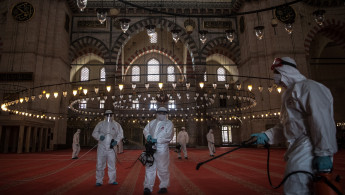WHO issues coronavirus guidelines for Eid Al-Adha, as Muslim families prepare to celebrate
The World Health Organisation (WHO) has issued guidelines for the upcoming celebrations of the Eid Al-Adha festival, as the Covid-19 pandemic continues worldwide.
The festival is connected to the annual Hajj pilgrimage and in normal times Muslims mark it by visiting family and friends and attending communal prayers and celebrations. Most Muslim families also sacrifice an animal and give its meat to the poor.
However, the WHO's Eastern Mediterranean Regional Office (EMRO), which covers 21 predominantly Muslim nations, said that this year countries should seriously consider "cancelling crowded religious and social gatherings".
At a virtual press conference, EMRO Regional Director Dr. Ahmed Al-Mandhari said that as Eid Al-Adha approaches, the risk of Covid-19 infection will increase as people begin to attend religious and social events.
Read more: One million people in Turkey 'at risk from coronavirus' during Eid al-Adha Muslim holiday
Al-Mandhari called on people attending religious and social events and authorities policing them to observe a set of guidelines including maintaining a distance of at least one metre between people.
Other suggestions fpr government include finding, isolating, and providing care for people infected with Covid-19.
|
The WHO has also advised countries to impose "strict measures" regarding the sale of animals, their slaughter, and the distribution of their meat, advising people not to slaughter sick animals because this could be a potential vector of Covid-19.
It also called on specialised agencies and institutions observing social distancing guidelines to carry out the slaughter.
Dr. Al-Mandhari also expressed his praised Saudi Arabia’s decision to drastically reduce the number of pilgrims taking part in this year's Hajj pilgrimage, saying it was taken "for the safety of pilgrims and to strengthen health security" in the kingdom.
Up to 10,000 citizens and residents of Saudi Arabia have been allowed to take part in the Hajj this year, while residents of other countries have not been allowed to travel to Mecca to perform the pilgrimage.
By contrast, in August 2019 nearly 2.5 million people from across the world took part in the Hajj.
Al-Mandhari added that the number of coronavirus cases in the Middle East and North Africa had "began to stabilise and even reduce" over the past two weeks, saying that this was a "glimmer of hope for all of us".
He also noted that there was a wide variation between countries in the region, with some seeing a rise in cases and others a fall.

Follow us on Facebook, Twitter and Instagram to stay connected





 Follow the Middle East's top stories in English at The New Arab on Google News
Follow the Middle East's top stories in English at The New Arab on Google News
![Israeli forces ordered bombed Gaza's Jabalia, ordering residents to leave [Getty]](/sites/default/files/styles/image_330x185/public/2176418030.jpeg?h=a5f2f23a&itok=_YGZaP1z)

